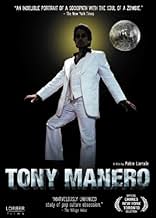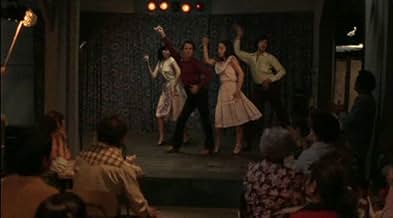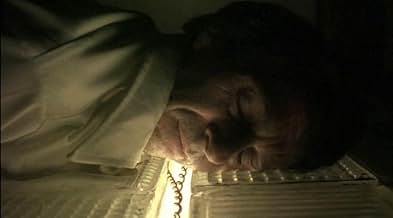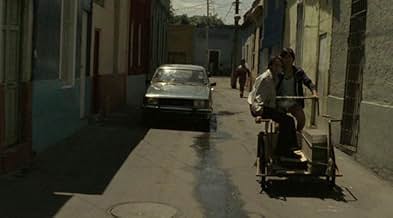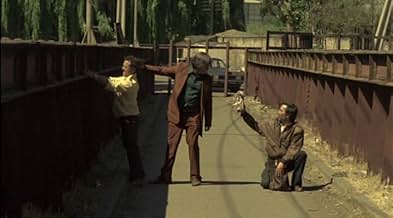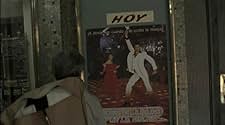IMDb RATING
6.8/10
4.7K
YOUR RATING
A man is obsessed with John Travolta's disco dancing character from La Fièvre du samedi soir (1977).A man is obsessed with John Travolta's disco dancing character from La Fièvre du samedi soir (1977).A man is obsessed with John Travolta's disco dancing character from La Fièvre du samedi soir (1977).
- Director
- Writers
- Stars
- Awards
- 19 wins & 16 nominations total
- Director
- Writers
- All cast & crew
- Production, box office & more at IMDbPro
Featured reviews
In the midst of the social context of the Pinochet dictatorship, Raúl Peralta, a man in his 50s, is obsessed with the idea of impersonating Tony Manero, John Travolta's character in the movie "Saturday Night Fever". Raúl leads a small group of dancers, who regularly perform at a bar on the outskirts. Every Saturday night, he unleashes his passion for movie songs by imitating his idol. His dream of being recognized as a successful showbiz star is about to come true when the national TV station announces a Tony Manero impersonator contest. His anxiety to reproduce the idol leads him to commit a series of crimes and thefts.
It is an extremely ambiguous film, at the same time that we feel sorry for the protagonist in the first ten minutes we feel the incredible that pulsates and disgust for its violent and obsessive data, bordering on the sick... A very interesting film with a differentiated approach, obsession for a idol, the dream of pursuing a profession and aggression taking on realistic contours...
It is an extremely ambiguous film, at the same time that we feel sorry for the protagonist in the first ten minutes we feel the incredible that pulsates and disgust for its violent and obsessive data, bordering on the sick... A very interesting film with a differentiated approach, obsession for a idol, the dream of pursuing a profession and aggression taking on realistic contours...
Edging to the annual awards season, this year a sure thing is that Chilean director Pablo Larrín will on everybody's radar with his one-two punch NERUDA (Chile's entry for the Best Foreign Language Film) and the formidable JACKIE, a biopic about Jacqueline Kennedy, may win its star Natalie Portman a second Oscar statue as a major player.
So here comes a warm-up to get acquainted with Larrín's previous work, TONY MANERO is his second feature, a sombre take on Chile's darkest time under the Pinochet regime peppered by a less sombre through-line: the 52-year-old protagonist Raúl Peralta's (Castro, Larrín's regular, an Al Pacino doppelgänger both in appearance and affective intensity, also the co-writer of the script) obdurate participation of a TV program "One O'Clock Festival", where a Tony Manero (the lead character in John Badham's Saturday NIGHT FEVER 1977, played by John Travolta) impersonation competition is scheduled in Santiago, 1978.
Examined closely by a hand-held Super 16mm, which intermittently toys with a blurry focus to accentuate the proximity of a sordid milieu, Raúl gives us the first impression of a pallid, taciturn, hangdog loner in the opening scenes where he mistakes the registration date as the actual contest, which will be held one week later. But that facet loses its disguise quickly, when he schematically assaults an old woman who has just been mugged on the street, at her own home, to take away her small boxy color TV set. He is not so much a petty criminal as a ruthless homicide, which ingeniously puts audience at the edge of the seat with a dreadful perturbation whenever he prowls or idles in the dilapidated environs, as violence could be erupted any moment if he sees the opportunity for a monetary gain, whoever the prey is.
Raúl lives with a coterie of amateur dancers in the scruffy house of Wilma (Poblete), where they also occasionally perform to entertain customers. His troupe includes Cony (Noguera), his friend- with-benefit, her adolescent daughter Pauli (Lattus) and Pauli's boyfriend Goyo (Morales). Together they help Raúl to rehearse the John Travola routine, but there is seething tension underneath, Raúl becomes impotent during an overtly explicit rumpy-pumpy, and is mocked by Cony that the only thing can revitalize him is the urge to win the competition, which sours their relationship, Goyo is involved with some surreptitious anti-Pinochet movement, which will put everyone under the interrogation of Pinochet's plainclothes secret police, although Raúl manages to skulk out since it is his big day.
Larrín's tack doesn't shy away from being obstinately provocative, up to an instance of sickeningly scatological malevolence, which seems like an unwarranted feeler to validate its sky's-the-limit artsy taste. But on the other hand, Larrín and his co-writers perspicuously cast a phenomenon of American culture invasion as an escapism for the amoral and the hard-up living under the terror of an autocracy, which indisputably hits the mark of liberating its restrained but astringent political manifesto.
Alfredo Castro is absolutely electrifying to watch from A to Z in the central role, holding Raúl's interior thoughts at bay, but excellently transforms himself onto the screen as a ravishingly volatile monster, with no fear, no conscience, no hold-up can stop his destructive/self-destructive wantonness (as the inauspicious ending dauntingly beckons), who should be answer for this type of societal mutator? The culprit is clear as day in this slam-bang critique of a bygone era weighing heavily on Larrín's fatherland.
So here comes a warm-up to get acquainted with Larrín's previous work, TONY MANERO is his second feature, a sombre take on Chile's darkest time under the Pinochet regime peppered by a less sombre through-line: the 52-year-old protagonist Raúl Peralta's (Castro, Larrín's regular, an Al Pacino doppelgänger both in appearance and affective intensity, also the co-writer of the script) obdurate participation of a TV program "One O'Clock Festival", where a Tony Manero (the lead character in John Badham's Saturday NIGHT FEVER 1977, played by John Travolta) impersonation competition is scheduled in Santiago, 1978.
Examined closely by a hand-held Super 16mm, which intermittently toys with a blurry focus to accentuate the proximity of a sordid milieu, Raúl gives us the first impression of a pallid, taciturn, hangdog loner in the opening scenes where he mistakes the registration date as the actual contest, which will be held one week later. But that facet loses its disguise quickly, when he schematically assaults an old woman who has just been mugged on the street, at her own home, to take away her small boxy color TV set. He is not so much a petty criminal as a ruthless homicide, which ingeniously puts audience at the edge of the seat with a dreadful perturbation whenever he prowls or idles in the dilapidated environs, as violence could be erupted any moment if he sees the opportunity for a monetary gain, whoever the prey is.
Raúl lives with a coterie of amateur dancers in the scruffy house of Wilma (Poblete), where they also occasionally perform to entertain customers. His troupe includes Cony (Noguera), his friend- with-benefit, her adolescent daughter Pauli (Lattus) and Pauli's boyfriend Goyo (Morales). Together they help Raúl to rehearse the John Travola routine, but there is seething tension underneath, Raúl becomes impotent during an overtly explicit rumpy-pumpy, and is mocked by Cony that the only thing can revitalize him is the urge to win the competition, which sours their relationship, Goyo is involved with some surreptitious anti-Pinochet movement, which will put everyone under the interrogation of Pinochet's plainclothes secret police, although Raúl manages to skulk out since it is his big day.
Larrín's tack doesn't shy away from being obstinately provocative, up to an instance of sickeningly scatological malevolence, which seems like an unwarranted feeler to validate its sky's-the-limit artsy taste. But on the other hand, Larrín and his co-writers perspicuously cast a phenomenon of American culture invasion as an escapism for the amoral and the hard-up living under the terror of an autocracy, which indisputably hits the mark of liberating its restrained but astringent political manifesto.
Alfredo Castro is absolutely electrifying to watch from A to Z in the central role, holding Raúl's interior thoughts at bay, but excellently transforms himself onto the screen as a ravishingly volatile monster, with no fear, no conscience, no hold-up can stop his destructive/self-destructive wantonness (as the inauspicious ending dauntingly beckons), who should be answer for this type of societal mutator? The culprit is clear as day in this slam-bang critique of a bygone era weighing heavily on Larrín's fatherland.
This film has lingered in my mind for a very long time.
The lead character is probably one of the scariest and most disturbing I have seen on cinema . He is without any morality and empathy but for some reason you are captivated by him and his life. You want him to succeed at first but as the film progresses you ate repulsed by him but stills obtain a fascination in his life. This is due to the writing and directing.?
The conditions and larger political scope of the film are well thought out, to live in that kind of fascistic government one such as the lead of this film is created and thrives. He is the logical product of that environment.
The scene when he kills the old woman for the TV is so disturbing i still think about it to this day and I saw it about three years ago.
The most haunting aspect for me was when he gets on the bus at the end and watches the winner of the competition and we all know what will happen, what he will do and what is store for his prey. Brilliant ending.
This is brutal, disturbing and amazingly directed.
The lead character is probably one of the scariest and most disturbing I have seen on cinema . He is without any morality and empathy but for some reason you are captivated by him and his life. You want him to succeed at first but as the film progresses you ate repulsed by him but stills obtain a fascination in his life. This is due to the writing and directing.?
The conditions and larger political scope of the film are well thought out, to live in that kind of fascistic government one such as the lead of this film is created and thrives. He is the logical product of that environment.
The scene when he kills the old woman for the TV is so disturbing i still think about it to this day and I saw it about three years ago.
The most haunting aspect for me was when he gets on the bus at the end and watches the winner of the competition and we all know what will happen, what he will do and what is store for his prey. Brilliant ending.
This is brutal, disturbing and amazingly directed.
The film, which conveys impressions from a country that is politically and economically collapsed, shows us how martial law situations actually get people out of control psychologically and sociologically rather than creating a control mechanism. You are increasingly watching your character's obsessions about the role model of a psychopathic character and their relationship with other people.
Ive been meaning to review this film for years as it has stayed with me from when I first sewed it many years ago.
I think this is a terrifying masterpiece, its underrated, under discussed, and shows the true horror of serial killers instead of the glamorous side of in such films such as Silence of the Lambs or the Tv series Mindhunter.
The connection of the Saturday Night Fever character to a serial is sheer perfection, its bizarre yet truly haunting.
I think this is a terrifying masterpiece, its underrated, under discussed, and shows the true horror of serial killers instead of the glamorous side of in such films such as Silence of the Lambs or the Tv series Mindhunter.
The connection of the Saturday Night Fever character to a serial is sheer perfection, its bizarre yet truly haunting.
Did you know
- TriviaSome clips and tunes from both La Fièvre du samedi soir (1977) and Grease (1978) appear in this film, the most prominent song heard is The Bee Gees' "You Should Be Dancing" from Saturday Night Fever. The final credits acknowledge Paramount Pictures for use of both films in this picture.
- GoofsThe "Members Only" jacket worn by Raul wasn't introduced until 1981, and the film takes place in 1978.
- Quotes
Title Card: [first lines]
Don Enrique: [subtitled version] And now we present our look-alike contest: 'The One O'clock Festival'
Security Guard: Wait here, please.
- ConnectionsFeatured in Sin maquillaje: Alfredo Castro (2011)
- How long is Tony Manero?Powered by Alexa
Details
Box office
- Gross US & Canada
- $20,677
- Opening weekend US & Canada
- $3,305
- Jul 5, 2009
- Gross worldwide
- $687,406
- Runtime
- 1h 37m(97 min)
- Color
- Sound mix
- Aspect ratio
- 1.85 : 1
Contribute to this page
Suggest an edit or add missing content


